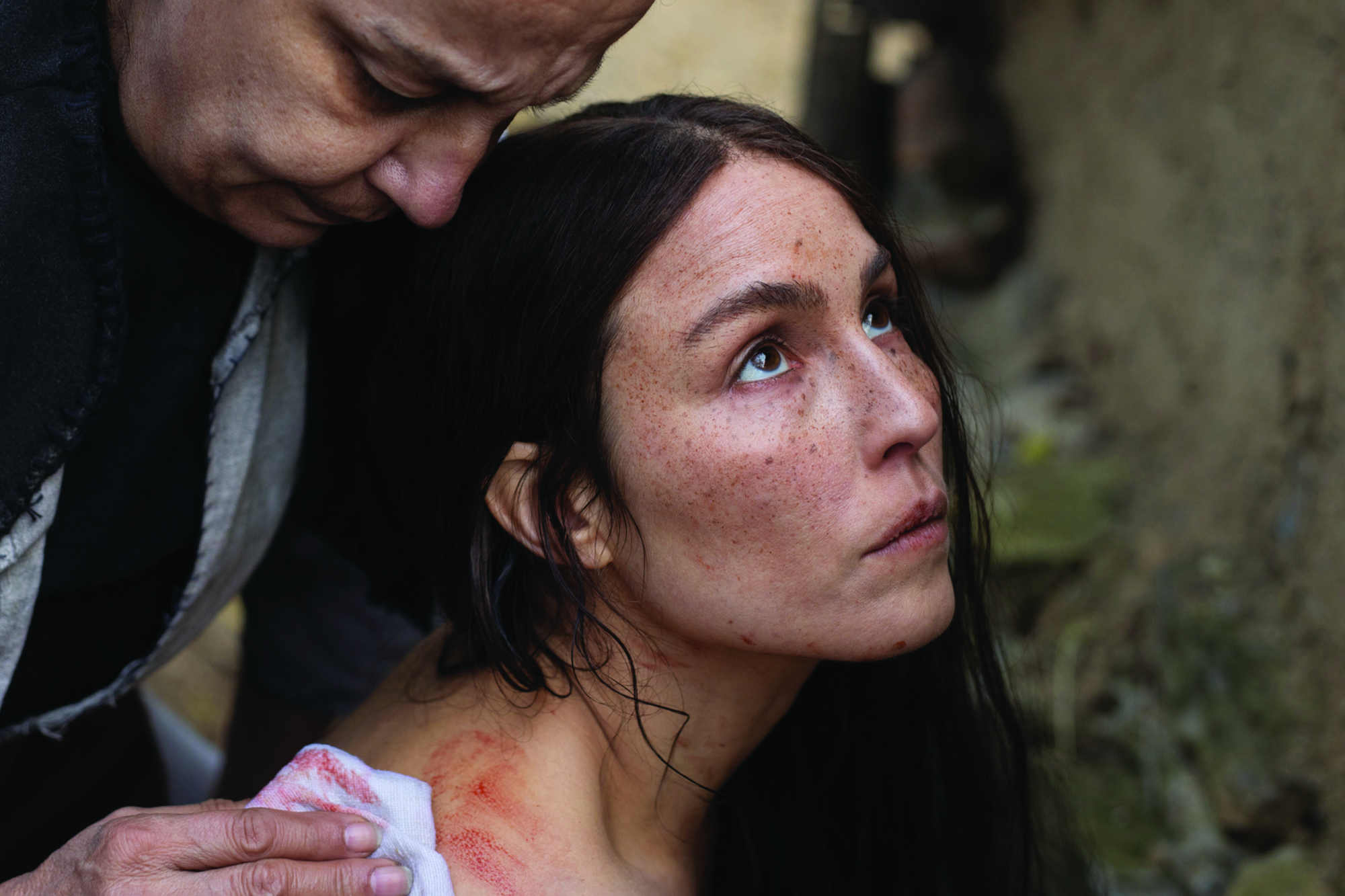In 1974, Kenneth Anger famously said that ‘making a movie is casting a spell’, describing ‘the cinematograph’ as a ‘Magick weapon’.[1]Kenneth Anger, quoted in Carel Rowe, ‘Illuminating Lucifer’, Film Quarterly, vol. 27, no. 4, Summer 1974, p. 26. Anger derived the term ‘magick’ from the work of occultist Alesteir Crowley, who defined the concept as a practice of willed transformation (in contrast with the signifiers that have come to be associated with the term ‘magic’). See Deborah Allison, ‘Magick in Theory and Practice: Ritual Use of Colour in Kenneth Anger’s Invocation of My Demon Brother’, Senses of Cinema, no. 34, February 2005, <https://www.sensesofcinema.com/2005/feature-articles/invocation_demon_brother/>, accessed 10 May 2022. From Maya Deren to Nina Menkes, other experimental filmmakers have drawn parallels between the art of filmmaking and witchcraft, a psychospiritual creative practice that has brought forth powerful yet largely indefinable new energies into our realm through the rituals of filmmaking. Like all rituals, filmmaking seen from this perspective is both transformative and powerful, and Anger’s deployment of magickal technologies becomes a poetic metaphor and active roadmap – one that charts how we can shift from thinking of the nuts and bolts of filmmaking as dry technique and raise it to a far loftier realm verging on the near-abstract, the ethereal, the wondrous. How can two images of different things cut together create meaning, story, emotion? How can the slight shift of a camera angle change the entire feeling of a shot? This is magick. This is cinema-as-witchcraft.
With You Won’t Be Alone (2022), Macedonian-Australian filmmaker Goran Stolevski casts a cinematic spell more powerful than most. In a small Macedonian village in the nineteenth century,[2]Despite being set in Macedonia, the film was shot entirely in Serbia and produced with Australian, Serbian and British funding. a witch whose legend has haunted the region for centuries (locally referred to as the ‘wolf-eateress’) looms large over the social and cultural imagination of its inhabitants. To stay alive, she must feed on the blood of animals and in particular – as a special delicacy and cherished treat – human newborns. As the witch (Anamaria Marinca) is about to feast upon the baby Nevena, her frightened mother makes a desperate compromise: if she is allowed to keep her daughter for just a few more years, the witch can have her as a protégé when she is older. Hidden in a cold, isolated cave where she can only see a tiny flicker of blue sky through a tiny opening in the roof, Nevena (Sara Klimoska) has been rendered mute by a cut in her mouth that was given to her by the witch when she was a baby, marking the girl as her property. Released from her mother to the loosely defined care of the witch, Nevena discovers an altogether different relationship with an older woman from the one that she had been previously accustomed to. Ascribed the sobriquet ‘witch-mama’ (in contrast with Nevena’s mother, whom she calls ‘whisper-mama’), the latter is, by her own admission, no maternal figure to speak of. Rather, she teaches the feral Nevena – who has grown up in complete isolation from society, with whisper-mama her only connection to any kind of civilisation – the ways of her world. This is an outsider’s world: a world of magick and darkness, a world of solitude, and a world of witchcraft.
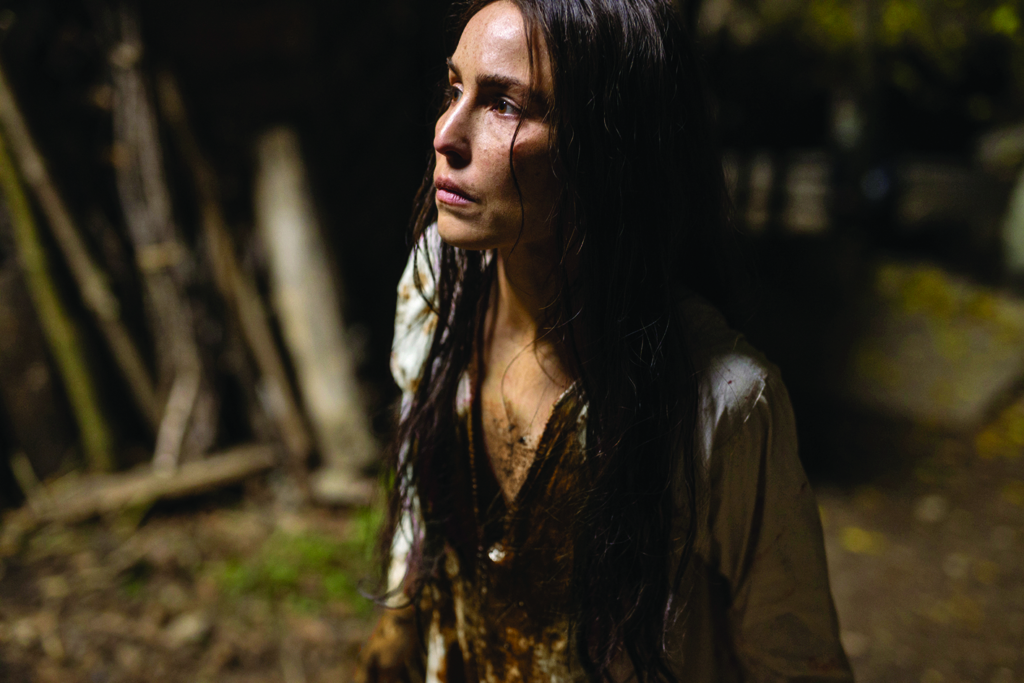
From witch-mama (or Old Maid Maria, as she is sometimes known), Nevena learns a crucial skill: how to shapeshift. Taking the forms of different creatures – babies, dogs, girls, women and men – Nevena body-hops from vessel to vessel, finding herself each time in a new body that has its own unique relationship to the society that it lives in. Shifting from skin to skin, she is granted the opportunity to learn things about not just the world as a whole but also those elements of herself that her own upbringing kept hidden from her. Spanning these identities, Nevena learns – often through great hardship – about desire, love and loss, hurtling towards an ultimate awareness of her own humanity.
While You Won’t Be Alone dabbles in generic terrain ostensibly synonymous with horror cinema, to reduce the film to such a simple descriptor denies the extraordinary vastness of Stolevski’s breakthrough feature debut, which premiered to wide acclaim at the Sundance Film Festival in January 2022. Critical comparisons to Terrence Malick[3]See, for example, Robert Daniels, ‘You Won’t Be Alone Review: Folklore Fairytale Horror Mixes with Terrence Malick Poetics About Humanity [Sundance]’, The Playlist, 23 January 2022, <https://theplaylist.net/you-wont-be-alone-review-gruesome-folklore-terrence-malick-sundance-20220123/>, accessed 10 May 2022. are apt, moving the film beyond what is often critically framed as a rather inflexible definitional space about what ‘is’ or ‘is not’ horror cinema, per se, as considered through the orthodox lens of genre in the most conventional sense. While horror is a broad, elastic field in its own right, You Won’t Be Alone feels – despite the centrality of witchcraft and its fantastic narrative conceits – at best genre-adjacent, rather than being a genre film as such. A spell cast by its director, Stolevski’s film magickally becomes something much greater than the sum of its parts, much greater than its generic iconography, and much more celestial, far grander and yet far slipperier than the nuts-and-bolts mechanics of characterisation or narrative might typically allow. You Won’t Be Alone is the work of witches.
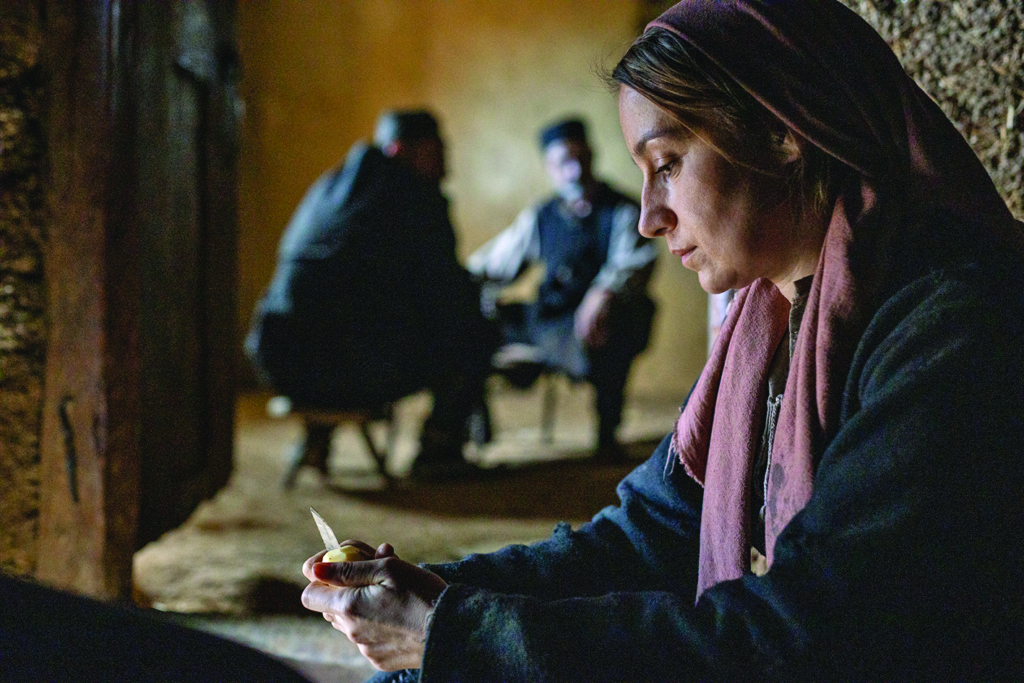
Women, witches and the gender politics of film
Ever since the notorious witch-hunts of colonial America and early modern Europe that spanned the fifteenth to eighteenth centuries and beyond, the figure of the burning witch has been laden with a significance that encompasses a range of gender-political meanings from all sorts of ideological perspectives: the dangerous woman suppressed; the innocent woman oppressed; the outsider brought inwards to the dominant social order and forced to obey its laws. Tales of witches – whether vicious historical accounts of women murdered en masse or those of legend, lore and folktale – are, at their heart, predominantly tales about power: who has it; who wields it; and who, ultimately, gets to keep it. And, going back centuries, as with so many things in life, the answer is almost always this: rarely women. Women are punished for overstepping lines of what is and is not broadly deemed acceptable in patriarchal cultures. Women who strive for the power of men are deemed interlopers or heathens; and if they have any success in doing so, they are monstrous, sorceresses, abominations, anomalies. All of them witches.
From the first wave of suffragettes onwards, however, wild, unruly and transgressive women took on a new political force when mobilised under the umbrella of what is today recognised as feminism. One need only look at the late-1960s New York City–based feminist activist group W.I.T.C.H. to find evidence of how the figure of the witch captured the imagination of women who understood the historical, social and cultural power of the term as a reference point upon which their desire to mobilise action against the broad patriarchal forces that dominate almost all societies could most effectively pivot. An acronym for ‘Women’s International Terrorist Conspiracy from Hell’ (although other claimed variants included ‘Women Infuriated at Taking Care of Hoodlums’, ‘Women Inspired to Tell their Collective History’ and ‘Women Interested in Toppling Consumer Holidays’), W.I.T.C.H. formed in the lead-up to Halloween 1968, when their first fully mobilised action was to turn up to Wall Street – complete with broomsticks and pointy hats – and cast a supposedly faux spell on this bastion of what Kim Gordon from Sonic Youth would later call ‘male, white, corporate oppression’.[4]A lyric from the 1990 Sonic Youthsong ‘Kool Thing’. Whether this spell was performative cheekiness or actual witchcraft remains open for debate; either coincidentally or as a result of supernatural forces, the next day the stock market reportedly fell thirteen points.[5]Mary McGill, ‘Wicked W.I.T.C.H: The 60s Feminist Protestors Who Hexed Patriarchy’, VICE, 29 October 2016, <https://www.vice.com/en/article/43gd8p/wickedwitch- 60s-feminist-protestors-hexed-patriarchy>, accessed 11 May 2022.
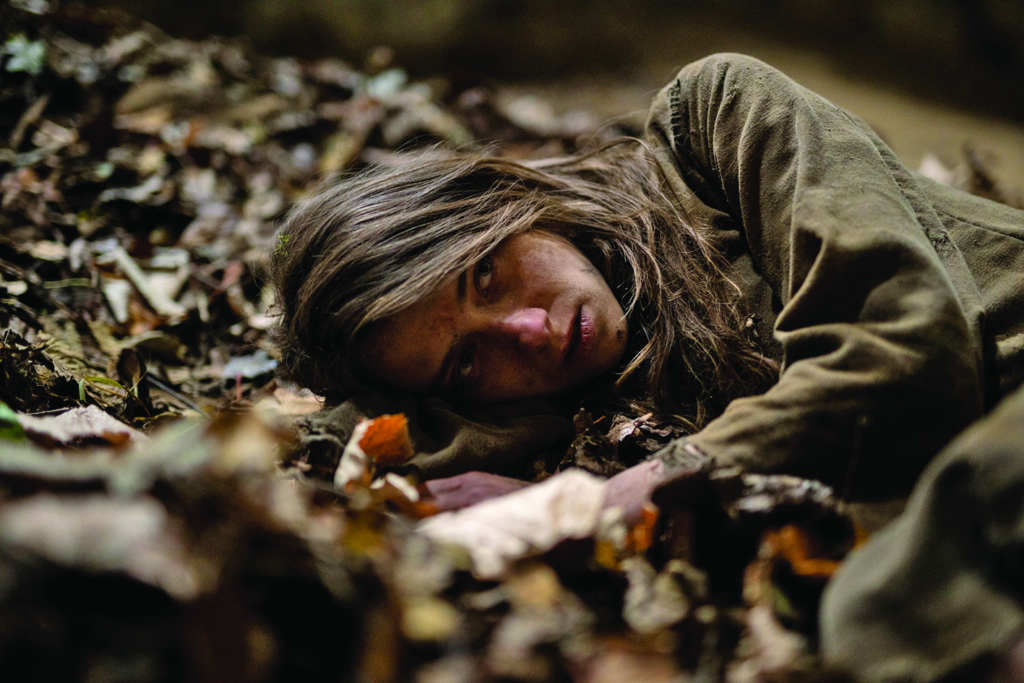
Since at least Ovid’s 8 AD narrative poem Metamorphoses, the witch has been configured as a threat to the dominant order. When it comes to screen culture, statistics demonstrate how strong that dominant order is when it comes to upholding the patriarchal status quo and excluding women, people of colour, queer people and people with disabilities, both at work behind the camera and in terms of representation on screen. A 2020 report by the Annenberg Inclusion Initiative that focused on gender, race and ethnicity in 1300 top movies from 2007 to 2019 found a 20:1 ratio of men to women directors, with only fifty-seven women appearing (a whopping forty-six of whom were white).[6]Annenberg Foundation & USC Annenberg Inclusion Initiative, ‘Inclusion in the Director’s Chair: Analysis of Director Gender & Race/Ethnicity Across 1,300 Top Films from 2007 to 2019’, January 2020, pp. 2–3, <https://assets.uscannenberg.org/docs/aii-inclusion-directors-chair-20200102.pdf>, accessed 11 May 2022. Recent high-profile awards won by women – such as Julia Ducournau’s Palme d’Or at Cannes in 2021, and Chloé Zhao and Jane Campion’s respective Best Director Oscars in 2021 and 2022 – perhaps give a surface indication that things are changing, but those Annenberg statistics are hard to swallow. In screen culture, women are still outsiders, their successes configured as anomalous – their power novel at best, and transgressive, dangerous or controversial at worst.
You Won’t Be Alone isn’t directed by a woman, nor is it about the plight of women in the film industry. But it is, at its core, about feminine power. In an interview with NME in 2021, the film’s big-name star and co–executive producer Noomi Rapace expressed,
I’ve always seen myself as a human rather than a woman. I’ve always felt alienated when they want to put me in a box, or when people expect me to behave a certain way just because my gender is female.[7]Noomi Rapace, quoted in Beth Webb, ‘Noomi Rapace: “I’m Expected to Behave a Certain Way Because My Gender Is Female”’, NME, 2 December 2021, <https://www.nme.com/en_au/features/film-interviews/noomi-rapace-interview-lamb-dragon-tattoo-3109543>, accessed 11 May 2022.
More recently, reflecting on her role in the film, Rapace has noted that stories about witches
are created by men, to start with, to tackle the fear of women and female power. It’s easy to say that someone is a witch and that the force and the powers and the strength she has is non-human because that’s easier.[8]Noomi Rapace, quoted in Haley Bosselman, ‘Noomi Rapace on You Won’t Be Alone: “Like Nothing I’ve Ever Seen”’, Los Angeles Confidential, 5 April 2022, <https://laconfidentialmag.com/noomi-rapace-you-wont-be-alone-interview>, accessed 11 May 2022.
Yet, as much as it is focused on the plight of women, the heart of You Won’t Be Alone transcends the bodies we find ourselves in; like Nevena, the film allows us to shapeshift, body-hop and even just fleetingly gain insight into far more universal human experiences. As Rapace has put it, ‘You Won’t Be Alone is a beautiful film about belonging and finding yourself and fighting for your own dream and not allowing anyone to hold you back.’[9]ibid.
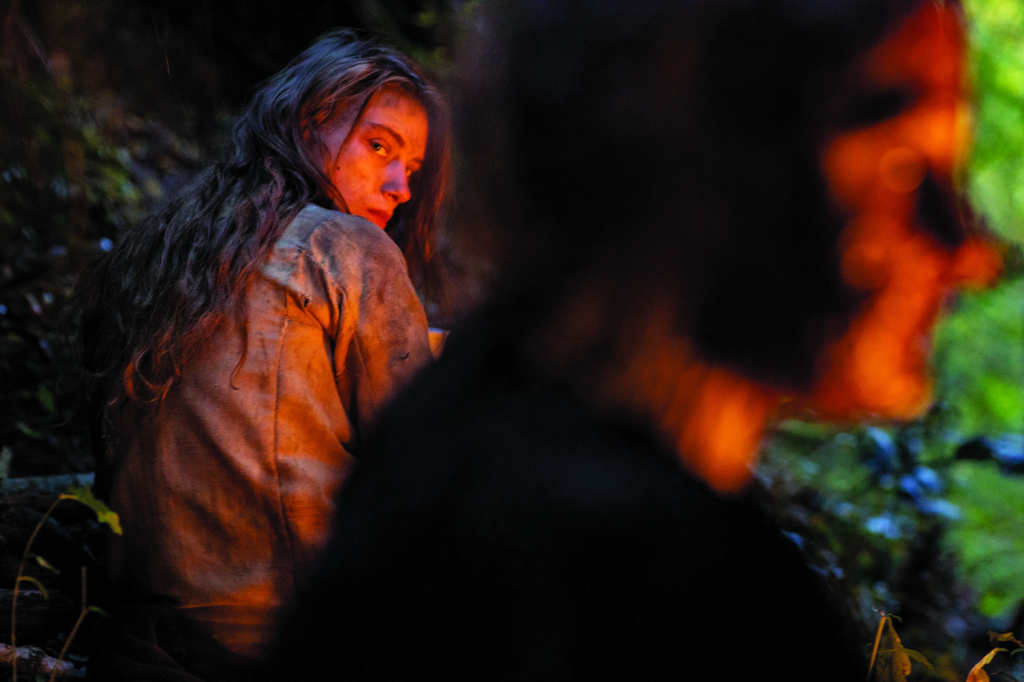
And yet…
Opening with a cat’s-eye view of a rural Macedonian idyll, as the animal rushes through the village past children singing and into the home where baby Nevena lies near her mother, You Won’t Be Alone is permeated from its very first scene by the pervasive drumbeat of a demand that we think outside of our own skin. Here, we are to rethink the role of language and how it relates to power, too; spoken in Macedonian and subtitled in English, Nevena’s voice is only heard indirectly. Though she is unable to speak within the diegesis of the film, the magick of cinema grants her inner voice a central place in the way the film is constructed. Her voiceover narration – retaining in-character vocabulary and sentence construction true to her lived experience as a feral girl – dominates the film: a captivating, poetic presence through which we learn to understand the world as she sees it and that simultaneously renders the broader concept of voice both present and absent. ‘My voice didn’t run away,’ she says. ‘It went deep inside where no-one can touch it.’
The poignancy of her words increasingly reveals itself in the film as Nevena’s raw yet exquisite observations echo across the surface of Matthew Chuang’s beautiful cinematography. Her language is simple – basic, even – but nonetheless adds new dimensions of poetic complexity to the film’s textures:
I feel new rivers spin inside me.
Whoosh they whoosh in.
Deeper, deeper inside me.
Later, she observes,
It’s a burning, breaking thing.
This world.
A biting, wretching thing.
And yet … and yet …
Nevena’s journey stretches out; through language, and through both her own body and her experiences within the bodies of others, she is empowered by knowledge gained from not just one life, but many. While inhabiting the body of new mother and villager Bosilka (Rapace) early in the film, her sudden changes in personality are accepted by the townsfolk as a product of what one of the village men calls ‘woman-madness’, but what the women in the community who flock around her understand as the result of domestic violence. (‘From the blows, all of it,’ says an older woman. ‘From the blows.’) And here, with Bosilka’s violent husband, Nevena learns: ‘The man, the eye-water he wants,’ she says; and later, ‘When the man is in the room, you are not a woman. You are stew. You are bread. Your place – it is inside his palm. You trickle out. Like water, trickle out and around him.’ Importantly, however, there is a flip side to this: Nevena also has her first glimpses of love, of support and of the comfort that others provide. ‘When the women are in the room, your mouth, should never stop opening,’ her voiceover tells us. ‘When her eyebrows lift up, yours – you lift them up too. When her eyes go wide, yours – you make them go wide too.’
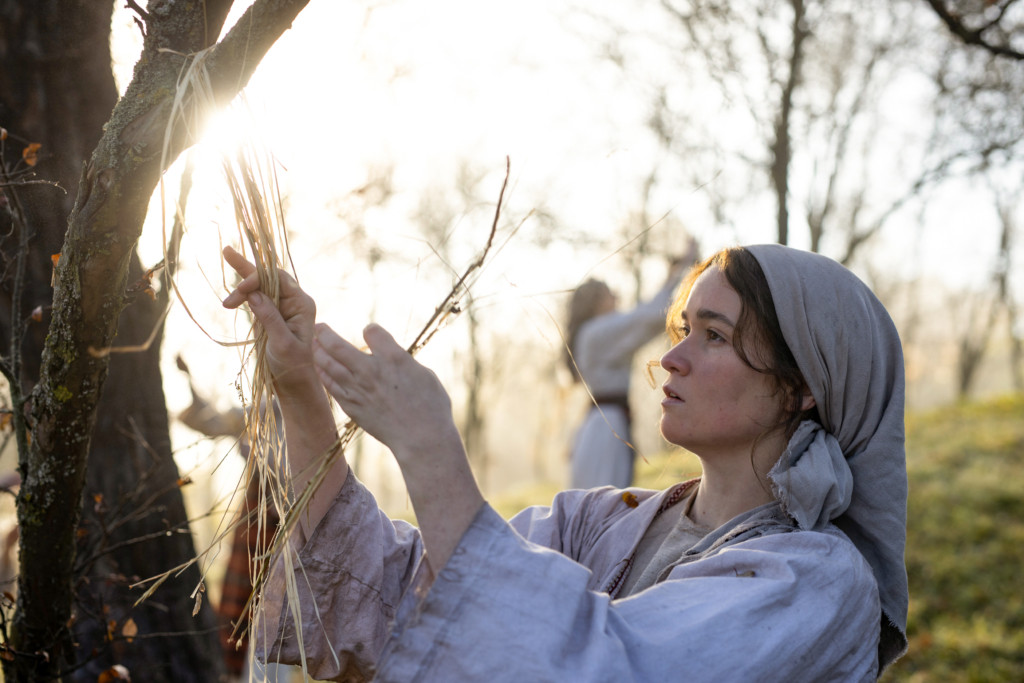
Body-hopping from woman to man and back again (‘Man, oh man, oh man,’ she says at the discovery of her penis), Nevena learns about desire, love, community, and the beauty and simplicity of traditional ceremonies and celebrations. And we learn something about the essence of what it is to be alive, to be our ‘I’, to be both outsiders and a part of something bigger than ourselves, through a cinematic spell cast in a way quite unlike any other movie before. Not horror but not not-horror, not ‘elevated’ or anything so pompous or pretentious, You Won’t Be Alone uses the language of visceral body and folk traditions to paint in broad, sweeping strokes something genuinely original, truly captivating and frankly unforgettable.
Endnotes
| 1 | Kenneth Anger, quoted in Carel Rowe, ‘Illuminating Lucifer’, Film Quarterly, vol. 27, no. 4, Summer 1974, p. 26. Anger derived the term ‘magick’ from the work of occultist Alesteir Crowley, who defined the concept as a practice of willed transformation (in contrast with the signifiers that have come to be associated with the term ‘magic’). See Deborah Allison, ‘Magick in Theory and Practice: Ritual Use of Colour in Kenneth Anger’s Invocation of My Demon Brother’, Senses of Cinema, no. 34, February 2005, <https://www.sensesofcinema.com/2005/feature-articles/invocation_demon_brother/>, accessed 10 May 2022. |
|---|---|
| 2 | Despite being set in Macedonia, the film was shot entirely in Serbia and produced with Australian, Serbian and British funding. |
| 3 | See, for example, Robert Daniels, ‘You Won’t Be Alone Review: Folklore Fairytale Horror Mixes with Terrence Malick Poetics About Humanity [Sundance]’, The Playlist, 23 January 2022, <https://theplaylist.net/you-wont-be-alone-review-gruesome-folklore-terrence-malick-sundance-20220123/>, accessed 10 May 2022. |
| 4 | A lyric from the 1990 Sonic Youthsong ‘Kool Thing’. |
| 5 | Mary McGill, ‘Wicked W.I.T.C.H: The 60s Feminist Protestors Who Hexed Patriarchy’, VICE, 29 October 2016, <https://www.vice.com/en/article/43gd8p/wickedwitch- 60s-feminist-protestors-hexed-patriarchy>, accessed 11 May 2022. |
| 6 | Annenberg Foundation & USC Annenberg Inclusion Initiative, ‘Inclusion in the Director’s Chair: Analysis of Director Gender & Race/Ethnicity Across 1,300 Top Films from 2007 to 2019’, January 2020, pp. 2–3, <https://assets.uscannenberg.org/docs/aii-inclusion-directors-chair-20200102.pdf>, accessed 11 May 2022. |
| 7 | Noomi Rapace, quoted in Beth Webb, ‘Noomi Rapace: “I’m Expected to Behave a Certain Way Because My Gender Is Female”’, NME, 2 December 2021, <https://www.nme.com/en_au/features/film-interviews/noomi-rapace-interview-lamb-dragon-tattoo-3109543>, accessed 11 May 2022. |
| 8 | Noomi Rapace, quoted in Haley Bosselman, ‘Noomi Rapace on You Won’t Be Alone: “Like Nothing I’ve Ever Seen”’, Los Angeles Confidential, 5 April 2022, <https://laconfidentialmag.com/noomi-rapace-you-wont-be-alone-interview>, accessed 11 May 2022. |
| 9 | ibid. |
